Sources
- Moeller, Jack; Adolph, Winnifred R.; Mabee, Barbara; Berger, Simone (2002), Kaleidoskop (6 ed.), Boston, MA: Houghton Mifflin Company, ISBN 0-618-10312-0
Janos Bardi (born 1923 in Budapest, d. 1990 in Hamburg) was a journalist and writer. He worked as a journalist until after World War II, when the authoritarian government then in power no longer allowed him to write for newspapers. He then worked as a deckhand but continued to write stories and satires, one of which caused him to be arrested. After the Hungarian Revolution of 1956, he escaped to West Germany where he found work as a journalist. Bardi continued to write short stories, radio plays, and satires for cabaret until his death in Hamburg in April 1990.

Satire is a genre of the visual, literary, and performing arts, usually in the form of fiction and less frequently non-fiction, in which vices, follies, abuses, and shortcomings are held up to ridicule, with the intent of shaming individuals, corporations, government, or society itself into improvement. Although satire is usually meant to be humorous, its greater purpose is often constructive social criticism, using wit to draw attention to both particular and wider issues in society.

Karel Čapek was a Czech writer, playwright and critic. He has become best known for his science fiction, including his novel War with the Newts (1936) and play R.U.R., which introduced the word robot. He also wrote many politically charged works dealing with the social turmoil of his time. Influenced by American pragmatic liberalism, he campaigned in favour of free expression and strongly opposed the rise of both fascism and communism in Europe.
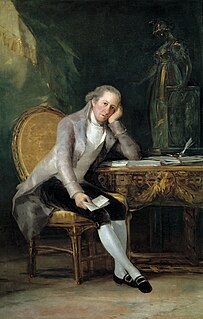
A writer is a person who uses written words in different styles and techniques to communicate ideas. Writers produce different forms of literary art and creative writing such as novels, short stories, books, poetry, plays, screenplays, teleplays, songs, and essays as well as other reports and news articles that may be of interest to the public. Writers' texts are published across a range of media. Skilled writers who are able to use language to express ideas well, often contribute significantly to the cultural content of a society.
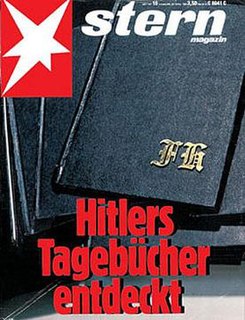
The Hitler Diaries were a series of 60 volumes of journals purportedly written by Adolf Hitler, but forged by Konrad Kujau between 1981 and 1983. The diaries were purchased in 1983 for 9.3 million Deutsche Marks by the West German news magazine Stern, which sold serialisation rights to several news organisations. One of the publications involved was The Sunday Times, which asked their independent director, the historian Hugh Trevor-Roper, to authenticate the diaries; he did so, pronouncing them genuine. At the press conference to announce the publication, Trevor-Roper announced that on reflection he had changed his mind, and other historians also raised questions concerning their validity. Rigorous forensic analysis, which had not been performed previously, quickly confirmed that the diaries were fakes.

The Sun Also Rises is a 1926 novel by American writer Ernest Hemingway, his first, that portrays American and British expatriates who travel from Paris to the Festival of San Fermín in Pamplona to watch the running of the bulls and the bullfights. An early and enduring modernist novel, it received mixed reviews upon publication. However, Hemingway biographer Jeffrey Meyers writes that it is now "recognized as Hemingway's greatest work", and Hemingway scholar Linda Wagner-Martin calls it his most important novel. The novel was published in the United States in October 1926 by Scribner's. A year later, Jonathan Cape published the novel in London under the title Fiesta. It remains in print.
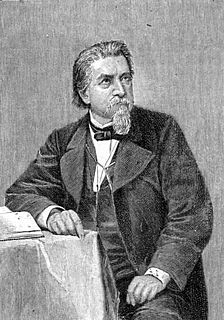
Karl Ferdinand Gutzkow was a German writer notable in the Young Germany movement of the mid-19th century.

Giovanni Villani was an Italian banker, official, diplomat and chronicler from Florence who wrote the Nuova Cronica on the history of Florence. He was a leading statesman of Florence but later gained an unsavoury reputation and served time in prison as a result of the bankruptcy of a trading and banking company he worked for. His interest in and elaboration of economic details, statistical information, and political and psychological insight mark him as a more modern chronicler of late medieval Europe. His Cronica is viewed as the first introduction of statistics as a positive element in history. However, historian Kenneth R. Bartlett notes that, in contrast to his Renaissance-era successors, "his reliance on such elements as divine providence links Villani closely with the medieval vernacular chronicle tradition." In recurring themes made implicit through significant events described in his Cronica, Villani also emphasized three assumptions about the relationship of sin and morality to historical events, these being that excess brings disaster, that forces of right and wrong are in constant struggle, and that events are directly influenced by the will of God.

George Mikes was a Hungarian-born British journalist, humorist and writer, best known for his humorous commentaries on various countries.

Pietro Maria Bardi was an Italian writer, curator and collector, mostly known for being the Founding Director of the São Paulo Museum of Art in Brazil.

Lina Bo Bardi, born Achillina Bo, was an Italian-born Brazilian modernist architect. A prolific architect and designer, she devoted her working life, most of it spent in Brazil, to promoting the social and cultural potential of architecture and design. While she studied under radical Italian architects, she quickly became intrigued with Brazilian vernacular design and how it could influence a modern Brazilian architecture. During her lifetime it was difficult to be accepted among the local Brazilian architects, because she was both a "foreigner" and a woman.
James Hannay FRSE, was a Scottish novelist, journalist and diplomat.
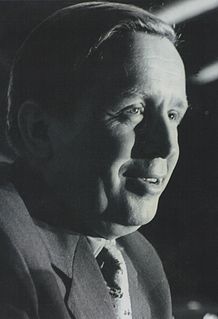
Branko Ćopić was a Bosnian-Herzegovinian, Serbian and Yugoslav writer. He wrote poetry, short stories and novels, and became famous for his stories for children and young adults, often set during World War II in revolutionary Yugoslavia, written with characteristic Ćopić's humor in the form of ridicule, satire and irony.
Behram Contractor, also known as Busybee, was an Indian journalist, humorist and the founder-editor of the newspaper The Afternoon Despatch & Courier, that was published between 1985 and 2019 from the city of Bombay/Mumbai.
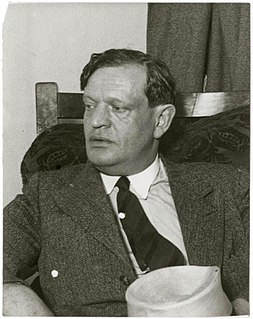
Frigyes Karinthy was a Hungarian author, playwright, poet, journalist, and translator. He was the first proponent of the six degrees of separation concept, in his 1929 short story, Chains (Láncszemek). Karinthy remains one of the most popular Hungarian writers. He was the father of poet Gábor Karinthy and writer Ferenc Karinthy.
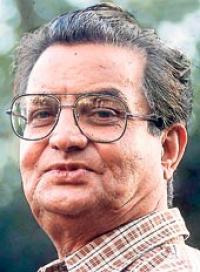
Manohar Shyam Joshi was a Hindi writer, journalist and scriptwriter, most well known as the writer of Indian television's first soap opera, Hum Log (1984) and his early hits Buniyaad (1987), Kakaji Kahin, a political satire and Kyaap, a novel which won him the Sahitya Akademi Award.
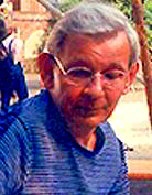
Felix Rexhausen was a German journalist, editor and author. As a journalist, he wrote for Kölner Stadt-Anzeiger, Westdeutscher Rundfunk, and the magazines Die Zeit and Der Spiegel.
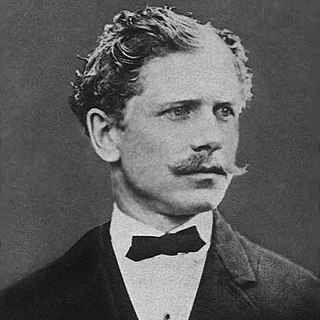
Ambrose Gwinnett Bierce was an American short story writer, journalist, poet, and Civil War veteran. His book The Devil's Dictionary was named as one of "The 100 Greatest Masterpieces of American Literature" by the American Revolution Bicentennial Administration. His story "An Occurrence at Owl Creek Bridge" has been described as "one of the most famous and frequently anthologized stories in American literature"; and his book Tales of Soldiers and Civilians was named by the Grolier Club as one of the 100 most influential American books printed before 1900.
Gour Kishore Ghosh was a Bengali writer and journalist.

Najem Wali is an Iraqi novelist and journalist, based in Germany.

The Bardi people, also spelt Baada or Baardi and other variations, are an Aboriginal Australian people, living north of Broome and inhabiting parts of the Dampier Peninsula in the Kimberley region of Western Australia. They are ethnically close to the Jawi people, and several organisations refer to the Bardi Jawi grouping, such as the Bardi Jawi Niimidiman Aboriginal Corporation Registered Native Title Body (RNTBC) and the Bardi Jawi Rangers.